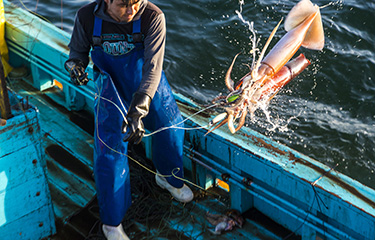Global fisheries often require assistance from third parties to ensure their operations meet the standards needed to attain certifications and other beneficial credentials.
Assistance sometimes comes in the form of direct investment, but fisheries more often achieve long-term success when that help involves long-lasting oversight and guidance, such as in the form of fishery improvement projects (FIPs), which have backed small fisheries in several locations around the world including Latin America.
The jumbo flying squid FIP in Peru, led by the Peruvian Chamber of Giant Squid (CAPECAL), various jumbo squid fishing associations, and the World Wildlife Fund (WWF), is one such example and aims to guarantee the stability of its stock moving forward – for the benefit of both local communities and supply chains.
WWF and CAPECAL, the latter of which includes 17 Peruvian processing and exporting companies representing more than 60 percent of squid export value, are working with artisanal fisher organizations and cooperatives to improve the lives of fishers, sustain healthy stocks, improve assured supply, and reduce operational risks for companies.
Most of the funding for the project is being contributed by industry participants, with some resources for the FIP coming from a joint project between the Walton Family Foundation and the U.S. Agency for International Development (USAID) called Por La Pesca, which supports artisanal fisher organizations and cooperatives to reduce illegal, unreported, and unregulated (IUU) fishing and promote responsible and profitable fishing practices.
The jumbo flying squid fishery is the second-largest fishery in Peru behind the country’s anchovy fishery. It includes more than 25,000 fishers and 4,000 vessels landing approximately 500,000 pounds of squid annually, according to Aaron Canepa, a markets and fisheries officer with WWF Peru. Peruvian jumbo squid harvest represents 50 percent of total landings from the fishery, and approximately 90 percent of that total goes to international markets.
Despite the economic importance of the fishery to local communities and Peru as a whole, the national government has encountered obstacles prioritizing fisheries management, monitoring, and enforcement. Jumbo flying squid are highly migratory, which makes illegal fishing by distant-water fleets easier to carry out. A lack of coordinated international management within the fishery exacerbates the problem.
In addition to the Peruvian fleet, the Chilean and Ecuadorian national fleets also harvest squid from the fishery, which has led to full exploitation of the stock. The delicate balancing act of proper stock management is also threatened by the illegal construction of boats, and despite the Peruvian government's efforts to formalize vessel licensing, that threat has not yet abated.
Despite a lack of effective federal management, the stocks have remained fairly stable for now, but the FIP is aiming to ensure that remains the case well into the future by
solidifying the formalization of the Peruvian squid fishing fleet, which the federal government alone has been unable to implement. It also has the goals of improving the fishery’s data-collection processes and working with the Peruvian government and South Pacific Regional Fisheries Management Organization (SPRFMO) to improve the overall management and governance of the fishery.
“One of the goals is to have 3,500 boats licensed by the end of 2023,” Canepa said. “At the same time, WWF is piloting a new mobile electronic catch documentation system in the fishery called TrazApp, which is being used in several fishing communities to prove the legal origin of their catches and to have a historical fishing record.”
These focus areas represent the common goals of fishers, the conservation community at large, and supply chain companies, Canepa said.
As for data collection, a federal watchdog already exists in Peru. The Marine Institute of Peru (IMARPE) is a governmental body that evaluates stocks to generate recommendations for fishing quotas, seasons, and general sustainability. However, since the Peruvian government has limited resources to carry out the program, members involved in the FIP have decided to partner up with the government to maximize its potential.
A collaborative relationship between the industry, mainly represented by CAPECAL; fishers, mainly represented by APAMARPA, an artisanal fishing shipowners association; and NGOs, including the Sustainable Fisheries Partnership and WWF, are supplementing IMARPE and other related governmental efforts.
“From this experience, it is important to highlight the role of artisanal fishers in getting involved in a research initiative by making their boats available to carry out the surveys,” CAPECAL President Gerardo Carrera said. “This has reinforced their [fishers’] interest in participating in fisheries management and continuing with the process of formalizing their fleet. Likewise, CAPECAL members actively support this research.”
While these efforts focus on improving national management, other bodies such as Global Fishing Watch have been following distant-water fleet activity within the fishery. According to Global Fishing Watch, 95 percent of the 615 distant-water squid vessels active in the fishery have been identified as being flagged to China. The remaining 5 percent were flagged to Chinese Taipei and the Republic of Korea.
Peru, which was the first Latin American country to share its vessel monitoring system data with Global Fishing Watch, along with the FIP’s involved parties hope that proper data collection and fleet formalization, will help to cut down on IUU activities that domestic or foreign fleets may be carrying out, according to Carrera. These endeavors to improve national and international management of the fishery have important market implications beyond assured supply, Carrera said. A stated goal of the FIP is to become Marine Stewardship Council (MSC)-certified, a precondition demanded by several international squid buyers. This provides another incentive to work with the government and other stakeholders to implement an effective management plan, according to Gilary Morales Tejada, a fisheries improvement officer with WWF Peru, who said she has seen these collaborative efforts pay off firsthand.
“Collaboration among the main actors in a fishery’s supply chain is indispensable for the advancement of the FIP,” Morales Tejada said. “This ensures the implementation of fishery improvements and, in turn, motivates the government to get involved in the process.”
Seafood2030 has sustainability resources translated into Spanish available for companies here.







